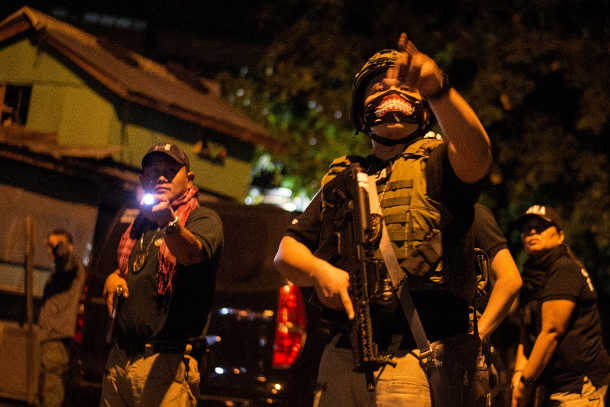
Philippine police secure a street as they search the house of a suspect in Taguig, south of Manila. (Photo: Noel Celis/AFP)
Former American president Woodrow Wilson once said: “Liberty has never come from government. Liberty has always come from the subjects of it. The history of liberty is a history of limitations of governmental power, not the increase of it.”
Congressional approval last week of a new anti-terrorism bill has not only challenged the limitations of governmental power in the Philippines but has also increased it vaguely and capriciously.
The bill has sparked outrage among many civil and church groups due to its ambiguous provisions defining acts of terrorism and by introducing a new crime called “incitement to commit terrorism.”
What makes this new crime so dangerous in the hands of a regime characterized by extrajudicial killings and police abuses?
Section 9 says that “incitement to commit terrorism is committed by any person, who without taking any direct part in the commission of terrorism, incites others to execute the crimes defined [under Section 4] by means of speeches, proclamations, writings, emblems, banners or other representations tending to the same end.”
The provision brands free speech and freedom of expression “terrorist acts” through the loosely qualified phrase “tending to the same end.” The bill lacks safety nets as to who will determine this qualification.
Fear of abuse looms when the determination is an executive power, particularly by the president instead of the courts, opening interpretations to suit political agenda.
Section 4 of the Philippine constitution’s Bill of Rights says “no law shall be passed abridging the freedom of speech, of expression, or of the press, or the right of the people peaceably to assemble and petition the government for redress of grievances.”
Activism is not terrorism. Dissent is not terrorism. In fact, in a democratic society, activism and dissent are essential for political maturity.
“That there must be no criticism of the president, or that we are to stand by the president, right or wrong, is not only unpatriotic and servile, but is morally treasonable to the public,” another US president, Theodore Roosevelt, said.
The bill in itself raised constitutional red flags such as widening law enforcers’ discretion in conducting arrests based on mere suspicion without any warrant.
These constitutional issues are not new to the Philippine Supreme Court. In a 2008 case, the court invalidated a vague statute with overly broad provisions because of its “chilling effect” upon protected speech.
The Supreme Court ruled that “a law is facially invalid if men of common intelligence must necessarily guess at its meaning and differ as to its application.”
The new bill’s definition of terrorism, as well as incitement to commit terrorism, is vague and could give rise to various interpretations by law enforcers. This increases their ability to commit abuses as the definition gives enforcers wider discretion in determining what terrorism and “inciting terrorism” are.
Their interpretation of laws and discretion are already being questioned by activists and rights groups.
On April 21, a policeman shot an army veteran suffering from post-traumatic stress disorder. The policeman had claimed that his life was in danger because the victim was about to shoot him with a .38 caliber pistol.
A National Bureau of Investigation report later revealed that the victim’s firearm was planted and had already appeared at several crimes scenes in various police reports. The gun was also unmarked and was immediately removed from the crime scene. It could not, therefore, be proven that the victim was carrying a firearm at the time he was shot.
Another area where the anti-terror bill might be implemented could be in tilting the scales of justice further in favor of the rich and the influential and against government critics.
Critics have often spoken out against this alleged pre-existing abuse of the law, which was recently illustrated on June 5 when police officers arrested seven protesters demonstrating against the anti-terrorism bill in Cebu City for violating Covid-19 quarantine restrictions. The protesters denied this, claiming they maintained social distancing and wore masks, but they were still prosecuted.
Meanwhile, police officers who allegedly didn’t follow social distancing rules were not arrested because they were attending a retirement party for a high-ranking official.
Institutions perish when the law is weaponized to silence government critics. But the government must remember that sovereignty resides in the people and all government authority emanates from them. So says the Philippine constitution.
Joseph Peter Calleja is a lawyer and editor of Bayard Philippines. He is also a member of the Lay-Religious Alliance of the Assumptionists. The views expressed in this article are those of the author and do not necessarily reflect the official editorial position of UCA News.


